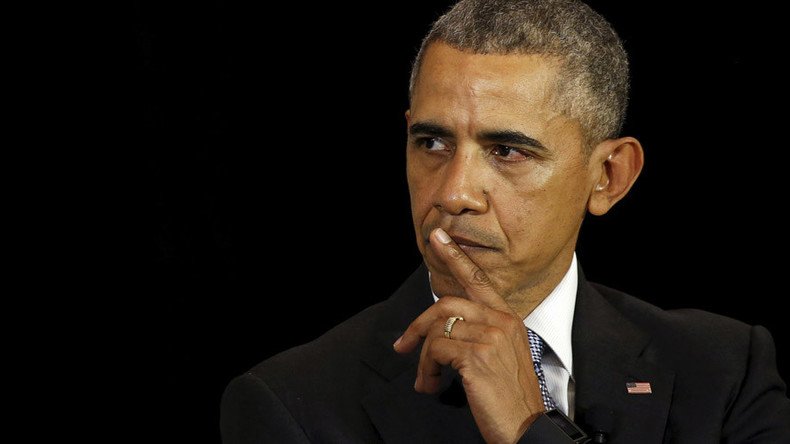Obama: ‘If we let Americans sue Saudis for 9/11, foreigners will begin suing US non-stop’

President Barack Obama has said the classified pages of the 9/11 Commission report that do not “compromise major national security interests” may “hopefully” be soon released, but argued against any potential legal action against Saudi citizens.
Obama, who flew to Saudi Arabia on Tuesday, discussed in an interview with Charlie Rose his relationship with the Saudi regime and the controversially-classified 28 pages of the report, which some believe contain links between 9/11 terrorists or Al-Qaeda and Saudi officials.
The full conversation aired Tuesday night on PBS after initially airing highlights on CBS News.
Former US Senator Bob Graham, who has seen the pages as intelligence committee chair, had already told the CBS program “60 Minutes” that he believes the Saudi government helped the 9/11 hijackers.
When asked by Rose if he had read the pages, Obama said he “had a sense of what’s in there.”
While admitting it has been a long time since the US intelligence started evaluating the data contained in the classified pages, Obama said that “a whole bunch of stuff” needs to be “verified.”
.@charlierose's interview with @POTUS tonight on @CBSEveningNews & tomorrow on @CBSThisMorning and @CharlieRoseShowpic.twitter.com/azQLdEd6BZ
— CBS This Morning (@CBSThisMorning) April 18, 2016
He hinted that “hopefully this process will come to a head very soon.”
“But this has been a process which we generally deal through the intelligence community, and Jim Clapper, our director of intelligence, has been going through to make sure that whatever it is that is released, is not going to compromise some major national security interests of the United States, and my understanding is that he’s about to complete that process,” said Obama.
Rose also asked about legislation that would allow the relatives of 9/11 victims to sue the Saudis, which passed the Senate Judiciary Committee in January, but has yet to be voted on by the full body.
9/11 families hit Obama for ‘siding with Saudi Arabia,’ want secret report declassified https://t.co/3y32r2QTThpic.twitter.com/uCp5sLm7sg
— RT America (@RT_America) April 18, 2016
Obama has said that he doesn’t support the bill, due to the possibility of foreign citizens – presumably victims of US wars and drone strikes – suing the government.
"If we open up the possibility that individuals in the United States can routinely start suing other governments, then we are also opening up the United States to being continually sued by individuals in other countries," the commander-in-chief said.
The Saudis have reportedly threatened to sell its $750 billion in US assets if Congress passes the law.
Saudi Arabia wants US to kill 9/11 bill, threatens to dump US assets worth $750 bn - report https://t.co/BRU6UhuINMpic.twitter.com/oWEbIiMXs1
— RT America (@RT_America) April 16, 2016
Obama described the US as “the world’s singular superpower” during the full interview and said anyone who doubts his willingness to take military actions should “ask Bin Laden.”
Responding to criticism that he did not use military power against Syrian President Bashar al-Assad when he stepped over the chemical weapon “red line”, Obama defended his decision saying, “Syria caved, they gave in. With the help of the Russians they acknowledge they had chemical weapons, signed up for an international treaty saying they wouldn’t have chemical weapons, and systematically removed them.”
Obama said the situation in the Ukraine has put “enormous strain on US-Russian relations” and that until the issue is resolved “tension and suspicion” between the two countries is preventing them from concentrating on the war in Syria.
Describing Russia and Ukraine as having a “deep historical link”, he compared Russia’s relationship with its western neighbor to “the same way we have an influence over Canada or Mexico.”
The NAFTA Trade Agreement is a disaster for both Mexico and the U.S. Full article at https://t.co/6bhs8xLAqMpic.twitter.com/clXm4YsMb0
— Students 4 Trump IL (@TrumpStudentsIL) April 1, 2016
Rose asked both Putin last year and Obama this week whether Russia has “emerged as a global player”, but the US president rejected his premise by responding that “Russia never stopped being a global player”.
Obama then provocatively said the “former” superpower showed weakness rather than strength by sending its military to states over which they previously had control, adding his own country’s influence wasn’t “based on us killing and muscling folks” but rather “they cooperate with us because they see that their interests are best served by working with us.”
READ MORE: ‘1st Gulf War biggest outcome – US still there, has no intention to leave’
The US president commented on the phone conversation he had with Putin about Syria shortly before he recorded Monday’s interview.
ISIS missile allegedly hits Turkish tank near Mosulhttps://t.co/kSyU3h1Xlepic.twitter.com/JX8GsGDUNl
— RT Play (@rt_play) April 19, 2016
“My call today to him was to indicate that we're starting to see it fray more rapidly. And if the United States and Russia are not in sync about maintaining it and getting a political track and transition moving, then we could be back in a situation we were three, four weeks ago,” Obama told Rose.
Obama said Russia is “very much committed to maintaining the structure of the Syrian state, which in theory, we don’t object to either.”
"Where we have continually butted heads, and this has been true for six years now is [Putin’s] insistence that he cannot back unilaterally the removal of [Syrian President Bashar al-Assad], that that's a decision that Assad and the Syrians have to make," the president added.
During Rose’s marathon interview with Putin in Moscow, he asked the Russian leader if he thought Obama listened to him and whether he thought Obama considered Russia and Putin an equal.
“Well, you ask him, he’s your president,” Putin said after laughing.












